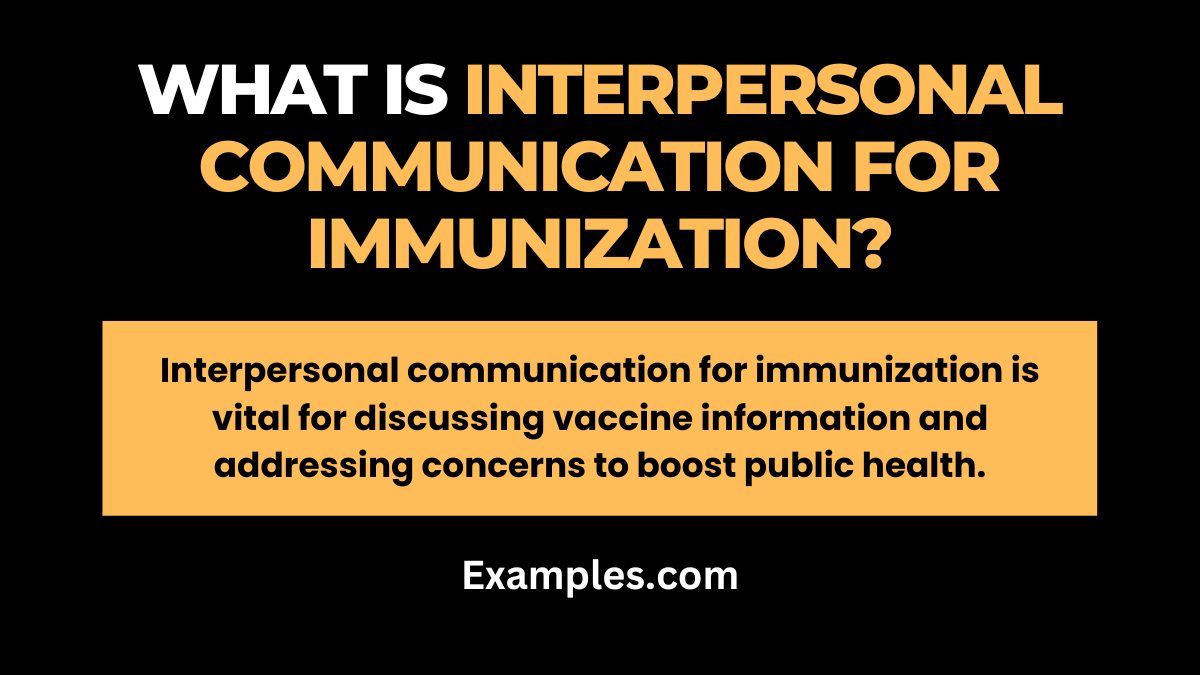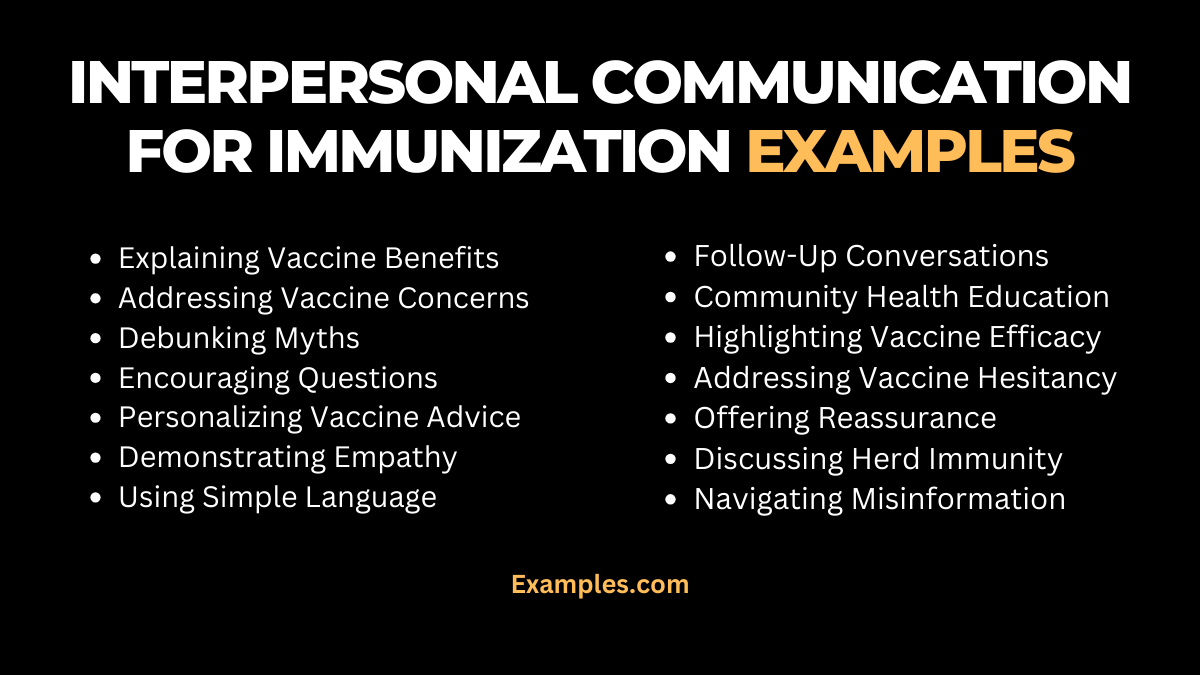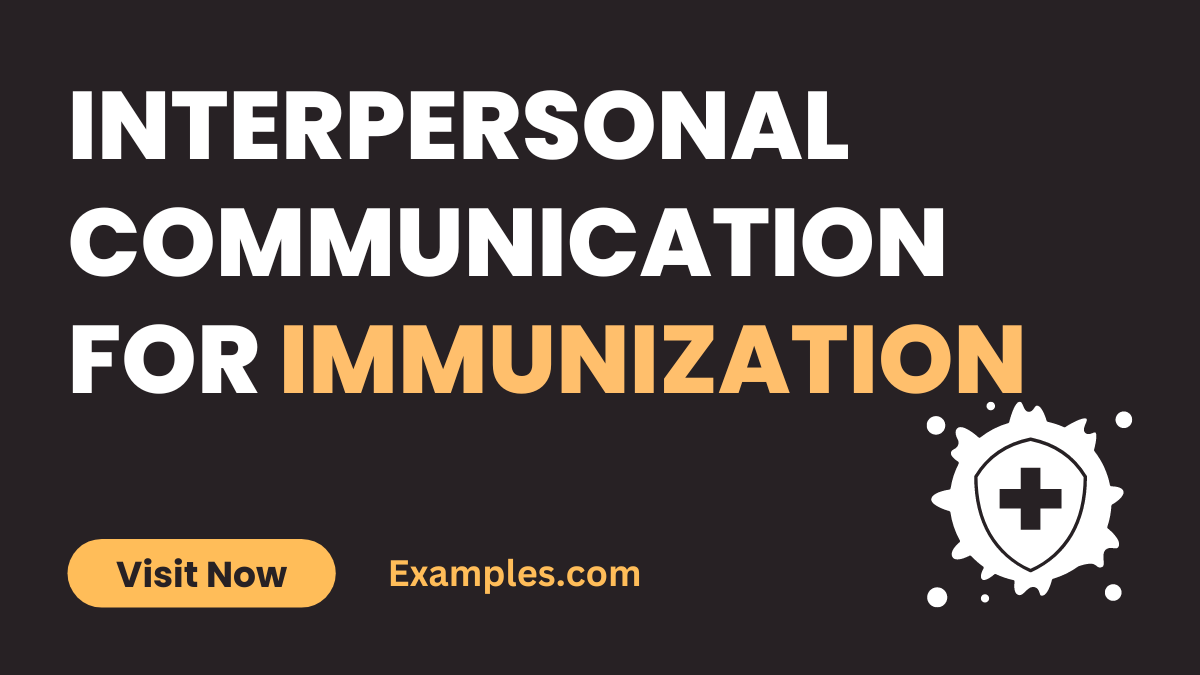14+ Interpersonal Communication for Immunization Examples
Interpersonal communication for immunization involves utilizing oral communication skills to effectively convey information about vaccines. This type of communication is crucial in healthcare settings where clear, accurate, and empathetic communication can significantly impact public health outcomes. It includes educating patients, addressing concerns, debunking myths, and encouraging informed decisions about immunization. Effective interpersonal communication in this context requires a balance of factual delivery and understanding of individual concerns, making it a vital skill for healthcare professionals.
What is Interpersonal Communication for Immunization?

Interpersonal communication for immunization refers to the exchange of information, concerns, and guidance between healthcare providers and individuals regarding vaccination. It encompasses verbal and non-verbal methods to educate, inform, and address queries related to immunization. This communication is essential in building trust, addressing vaccine hesitancy, and ensuring public awareness about the benefits and safety of vaccines. Effective communication in this area is key to enhancing public health initiatives and ensuring widespread immunization compliance.
15 Interpersonal Communication for Immunization Examples

Effective interpersonal communication for immunization is crucial in healthcare, involving clear, empathetic, and informative interactions between healthcare providers and individuals. This communication is essential for building trust, addressing concerns, and ensuring informed decisions about vaccinations. The following examples illustrate practical ways healthcare professionals can engage in meaningful discussions about vaccines, emphasizing clarity, empathy, and accurate information.
- Explaining Vaccine Benefits: “Vaccines protect both you and the community from serious diseases.” Highlighting the collective benefits of immunization.
- Addressing Vaccine Concerns: “I understand your concerns about side effects. Let’s review what you might expect.” Responding empathetically to patient apprehensions.
- Debunking Myths: “Actually, vaccines don’t cause the diseases they protect against. Here’s why.” Correcting misconceptions with factual explanations.
- Encouraging Questions: “Do you have any questions or worries about the vaccine?” Inviting open dialogue about vaccine-related queries.
- Personalizing Vaccine Advice: “Considering your health history, this is why the vaccine is recommended for you.” Tailoring advice to individual health situations.

- Demonstrating Empathy: “I know this information can be overwhelming. I’m here to help guide you.” Showing support and understanding.
- Using Simple Language: “This vaccine works like exercise for your immune system, building its strength against the virus.” Simplifying medical jargon.
- Follow-Up Conversations: “How have you been feeling since your vaccination?” Checking in on patient well-being post-vaccination.
- Community Health Education: “Let’s discuss how vaccines have historically helped control diseases in our community.” Educating on the broader impacts of vaccines.
- Highlighting Vaccine Efficacy: “This vaccine has a high effectiveness rate in preventing severe illness.” Sharing key efficacy data.
- Addressing Vaccine Hesitancy: “It’s normal to have questions. Let’s go through any concerns you have.” Engaging hesitations constructively.
- Offering Reassurance: “Millions have safely received this vaccine, and we monitor for safety continuously.” Providing reassurance backed by data.

- Discussing Herd Immunity: “When more people are vaccinated, it helps protect those who can’t get vaccinated.” Explaining the concept of herd immunity.
- Navigating Misinformation: “There’s a lot of information out there. Let’s go through what’s scientifically accurate.” Helping navigate through misinformation.
- Consent and Autonomy: “Your choice to get vaccinated is yours. Let’s ensure you have all the information you need.” Respecting patient autonomy
Interpersonal Communication for Immunization in Nursing
Effective interpersonal communication plays a crucial role in nursing, especially when it comes to immunization. Here are eight key points to optimize your approach:
- Establish Trust and Rapport: Begin by building trust and rapport with patients and their families. A warm and empathetic demeanor can alleviate fears and concerns related to immunization.
- Clear Information Sharing: Communicate information about the immunization process in a clear and understandable manner. Use plain language to ensure everyone comprehends the importance and benefits of vaccination.
- Active Listening: Practice active listening to address any questions or apprehensions patients may have. Encourage them to share their thoughts and concerns, and validate their feelings.
- Addressing Myths and Misconceptions: Be prepared to debunk common myths and misconceptions about immunization. Use evidence-based information to dispel fears and ensure informed decision-making.
- Informed Consent: Explain the importance of informed consent for immunization procedures. Ensure that patients or their legal guardians fully understand the process and potential risks.
- Emotional Support: Recognize that immunization can be emotionally charged for some patients. Offer emotional support and empathy, acknowledging their feelings and providing reassurance.
- Cultural Competence: Be culturally sensitive in your communication. Recognize and respect cultural beliefs and practices related to immunization while promoting its importance.
- Follow-Up and Documentation: After immunization, provide clear instructions for any necessary follow-up care. Accurate and thorough documentation of the immunization process is essential for continuity of care and record-keeping.
Interpersonal Communication for Immunization in Healthcare
Effective interpersonal communication within the broader healthcare context is vital for immunization efforts. Here are eight crucial points:
- Team Collaboration: Ensure that healthcare teams have effective interprofessional communication to coordinate immunization efforts seamlessly.
- Patient Education: Develop educational materials that focus on the importance of immunization and distribute them to patients through various communication channels.
- Vaccine Information Sharing: Use multiple channels, including digital platforms, to disseminate accurate and timely vaccine information, addressing concerns and promoting vaccination.
- Community Engagement: Engage with the community to raise awareness about immunization through community outreach programs and events.
- Provider-Patient Interaction: Encourage healthcare providers to engage in open and honest discussions with patients about immunization, addressing concerns and answering questions.
- Monitoring and Reporting: Establish effective systems for monitoring vaccine coverage and adverse events. Timely reporting of adverse events is critical for maintaining public trust.
- Crisis Communication: Be prepared to communicate effectively in times of vaccine-related crises. Transparency and clarity are key in maintaining public confidence.
- Policy Advocacy: Advocate for policies that support immunization and ensure access to vaccines for all populations. Effective advocacy communication can influence decision-makers positively.
Elements of Interpersonal Communication for Immunization
Interpersonal communication for immunization is essential, blending various elements to ensure effective dialogue and understanding.
- Clarity of Information: Presenting vaccine details clearly and understandably.
- Empathy: Showing understanding and concern for patient fears and questions.
- Active Listening: Fully engaging in and responding to patient queries.
- Cultural Sensitivity: Respecting diverse cultural beliefs around immunization.
- Non-Verbal Cues: Reinforcing messages through body language.
- Feedback Mechanism: Valuing and addressing patient feedback.
- Consistency: Maintaining uniformity in vaccine information.
- Persuasion Skills: Effectively addressing vaccine hesitancy and misinformation.
Stages of Interpersonal Communication for Immunization
The process of interpersonal communication for immunization follows key stages, each vital in the vaccination journey.
- Initiation: Starting discussions about vaccination.
- Information Delivery: Providing accurate vaccine information.
- Addressing Concerns: Resolving patient doubts and fears.
- Feedback Reception: Actively listening to patient responses.
- Persuasion: Convincing individuals of the benefits of vaccination.
- Reinforcement: Reiterating crucial points about vaccine safety.
- Follow-Up: Engaging in post-vaccination check-ins.
- Continued Education: Keeping updated on vaccine developments.
Importance of Interpersonal Communication for Immunization
Interpersonal communication is pivotal in immunization, playing multiple roles in enhancing public health.
- Promotes Vaccine Awareness: Raises understanding about vaccines.
- Builds Trust: Develops trust between healthcare providers and the public.
- Counters Misinformation: Corrects false vaccine information.
- Encourages Compliance: Motivates people to get vaccinated.
- Addresses Hesitancy: Reduces skepticism about vaccines.
- Supports Public Health: Contributes to wider health goals.
- Facilitates Informed Decisions: Empowers informed vaccine choices.
- Enhances Healthcare Relationships: Strengthens bonds between patients and providers.
What are the Roles of Interpersonal Communication in Immunization?
Interpersonal communication in immunization serves various roles, crucial for effective health communication.
- Educating the Public: Providing clear vaccine information.
- Addressing Concerns and Fears: Alleviating vaccine anxieties.
- Promoting Health Literacy: Enhancing understanding of health and vaccines.
- Building Community Trust: Gaining confidence in public health measures.
- Facilitating Behavior Change: Encouraging positive health actions.
- Managing Expectations: Setting realistic views about vaccination outcomes.
- Crisis Communication: Effective dialogue during health crises.
- Advocacy: Championing vaccination as a key public health tool.
Effective interpersonal communication is key in fostering strong relationships and successful immunization campaigns. This guide highlights the various types, roles, and importance of interpersonal communication, especially in the context of health and education. By mastering these communication skills, individuals can enhance their personal interactions and contribute to public health efforts, underlining the impact of effective communication in personal and societal well-being.



